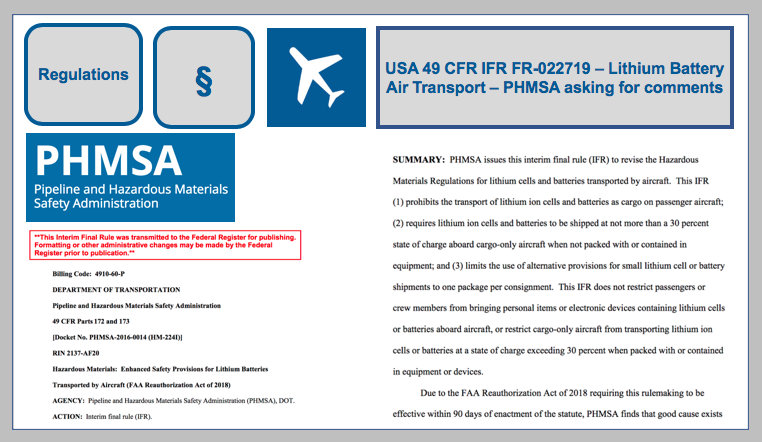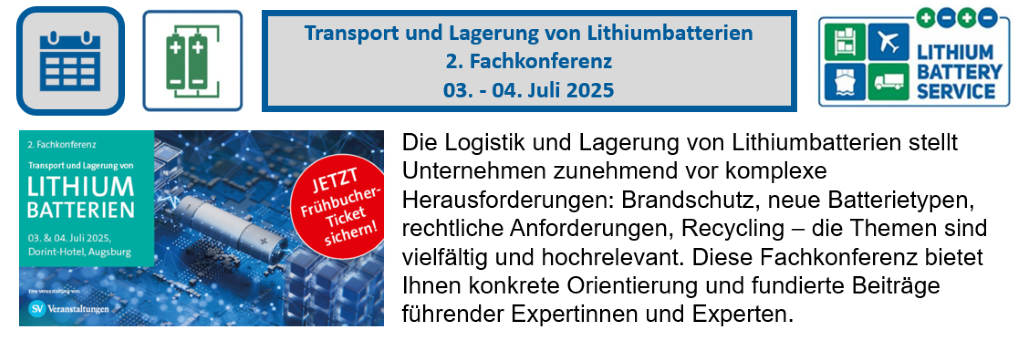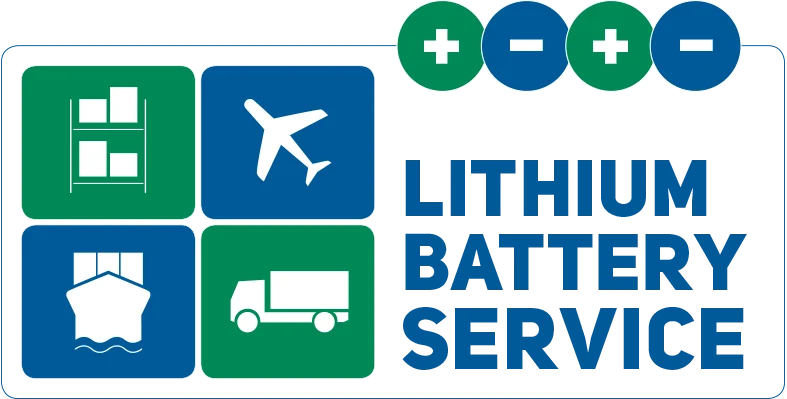USA 49 CFR IFR FR-022719 – Lithium Battery Air Transport – PHMSA asking for comments
USA 49 CFR IFR FR-022719 – Lithium Battery Air Transport – PHMSA asking for comments

USA 49 CFR IFR FR-022719 – Lithium Battery Air Transport – PHMSA asking for comments
Section 333 of the FAA Reauthorization Act dated 05. October 2018 implements the ICAO TI 2015-2016 regulations into US law and that requires the DOT to take action within 90 days. That would have been 03. January 2019. The statutory deadline could not be complied with because of the lapse in funding between 22. December 2018 and 25. January 2019 which effected the PHMSA, the FAA and other government agencies.
And usually there is time for comments within 30 days before becoming effective.
For the following this has not been done. For security reasons a delay of 30 days is not desired. The content of this IFR will be edited and maybe changed by the Federal Register. But with publishing by the Federal Register they will become effective immediately.
With this IFR FR-022719 published on 27. February 2019, PHMSA includes the requirements from ICAO 2015-2016:
Prohibition of UN3090 and UN3480 on passenger aircraft
Max. State of Charge SoC 30% for UN3480.
Max. one package with „small” lithium cells/lithium batteries per consignment (PHMSA defines small as the limits given in Section II of the PI in the ICAO TI).
Max. one overpack with one package of these „small” lithium cells/lithium batteries per consignment.
The document gives a very extensive time frame on the development of the regulations by PHMSA and gives background details on incidents/accidents and test that were conducted by the FAA and others.
State of Charge – SoC
Same as in the ICAO TI lithium ionn cells/batteries with a special permit (in compliance with 49 CFR Part 107, Subpart B) can be transported with a higher state of charge than 30%.
Aircraft Batteries
An approval for heavier aircraft lithium batteries for the transport on passenger aircraft was deleted.
Yet as before according to 49 CFR § 172.102 (c) (2) A51 UN2794 and UN2795 with a maximum weight of
100 kg per aircraft battery may be carried on passenger aircraft.
Small lithium cells/lithium batteries for medical devices
Newly included is an exception for max. two small lithium cells/lithium batteries as replacement for those in medical devices. They may be carried on board of passenger aircraft if the airport of destination is not daily serviced by cargo aircraft and truck link.
Two of such small lithium cells/lithium batteries for medical devices may be carried on passenger aircraft and that even at a state of charge of more than 30%.
An approval of the Associate Administrator is required. The person applying for the approval must prove the requirement of the destination not being reached otherwise.
PHMSA will decide on granting an approval or denying it within 45 days after receipt of the approval application.
A draft of the answer will be submitted to the FAA max. 30 days after the date of receiving the approval application and the FAA will conduct an on-site inspection max. 20 days after receiving the draft from PHMSA.
The requirements on packaging differ from those in Section II in the ICAO TI Packing Instruction for UN3090 and UN3480:
Each lithium cell/lithium battery must be individually packed in an inner packaging that completely encloses the cell or battery;
Placed in a rigid outer packaging; and
Protected to prevent short circuit.
A definition for medical device was added:
Medical device means an instrument, apparatus, implement, machine, contrivance, implant, or in vitro reagent, including any component, part, or accessory thereof, which is intended for use in the diagnosis of disease or other conditions, or in the cure, mitigation, treatment, or prevention of disease of a person.
Comments asked for
PHMSA encourages persons to submitting comments regarding the implementation of the proposals in this document.
Comments may be submitted by Docket Number which is PHMSA-2016-0014 (HM-2241) via:
Federal eRulemaking Portal: www.regulations.gov
Fax: +1-202-493-2251
Letter Mail: Docket Operations, U.S. Department of Transportation, West Building, Ground Floor, Room W12-140, Routing Symbol M-30, 1200 New Jersey Avenue, SE, Washington, DC 20590, USA
Hand Delivery: Docket Operations, U.S. Department of Transportation, West Building, Ground Floor, Room W12-140 im Erdgeschoss des West Building, Routing Symbol M-30, 1200 New Jersey Avenue, SE, Washington, DC 20590, USA: Monday through Friday, except Federal Holidays.
All submitted comments must bear the agency name and the docket number for the rulemaking at the beginning of the comment. All comments will be posted without change tot he docket management system, including any personal information provided.
Docket: For access to the dockets to read background documents or comments received, go to www.regulations.gov or DOT´s Docket Operations Office (see PHMSA website under addresses).
Contact details for further information:
Shelby Geller +1-202-366-8553
PHMSA
DOT
Standards and Rulemaking Division
1200 New Jersey Avenue, SE, Washington DC 20590-0001
USA
Approval applications can be submitted via letter mail, via fax, electronically via email or via the PHMSA Online system.
The complete IFR FR-022719 document in English can be found here:
https://www.phmsa.dot.gov/sites/phmsa.dot.gov/files/docs/standards-rulemaking/hazmat/rulemakings/70526/lithium-battery-ifr-submitted-fr-022719.pdf
Manufacture according to Quality Management Program
Again with this alignment to the ICAO TI PHMSA does not include the requirement that all lithium cells and lithium batteries must be manufactured according to the required quality management program. The responsibility for this within the USA lies with the manufacturer of the lithium cells and lithium batteries.
But for each international shipping according to ICAO TI (and also according to the IMDG code and the ADR) it´s the shippers duty to only ship lithium cells and lithium batteries that were manufactured according to the quality management program.
What this quality management program looks like you can find out here:
https://www.lithium-batterie-service.de/en/quality-management-program
UN Test Series 38.3
But this requirement is also layed out in the 49 CFR for transports within the USA: Each lithium cell and each lithium battery (with the exception of pre-production prototypes and small series up to 100 pieces) must have successfully passed the UN Test Series 38.3.
What the UN Test Series 38.3 includes, you can find here:
https://www.lithium-batterie-service.de/en/un-38.3-test-series
You have questions regarding the transport of lithium cells and lithium batteries? We got the answers. Contact us under:
https://www.lithium-batterie-service.de/en/contact/consulting












